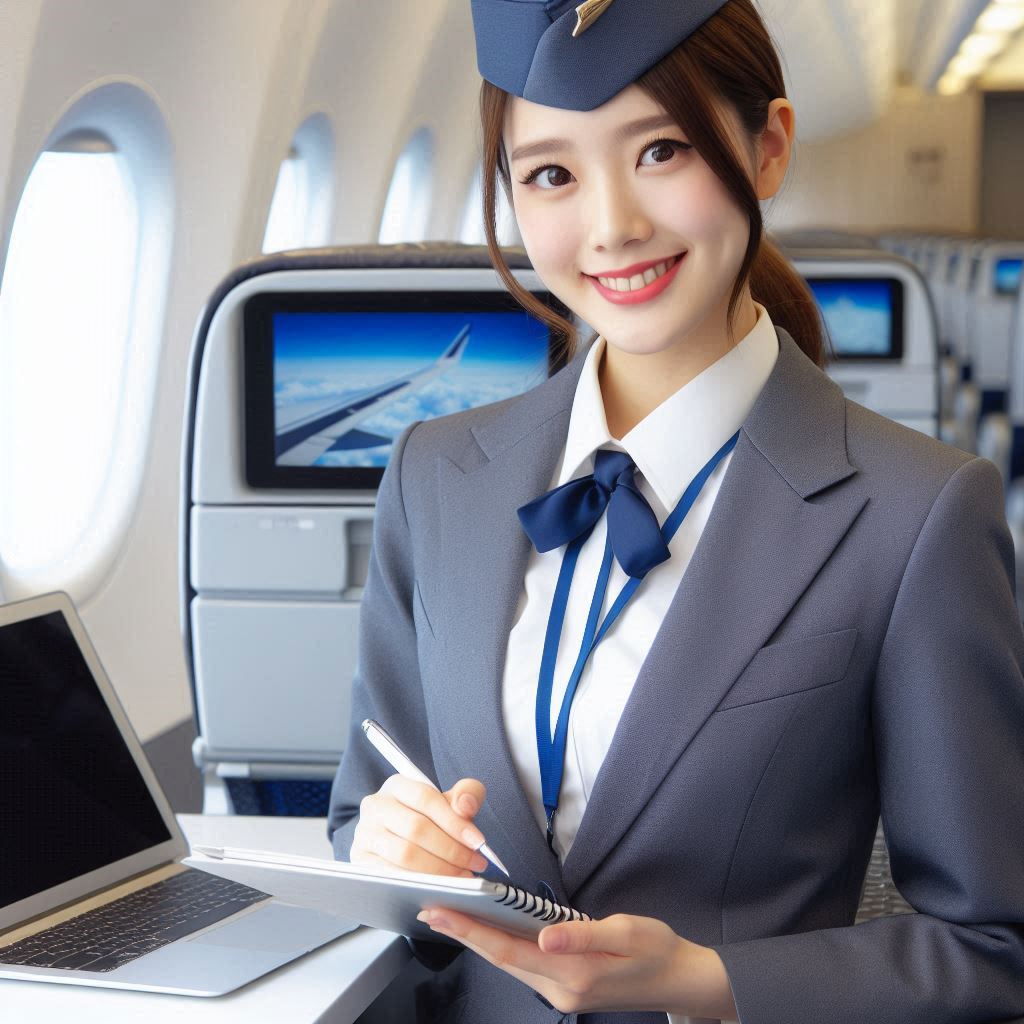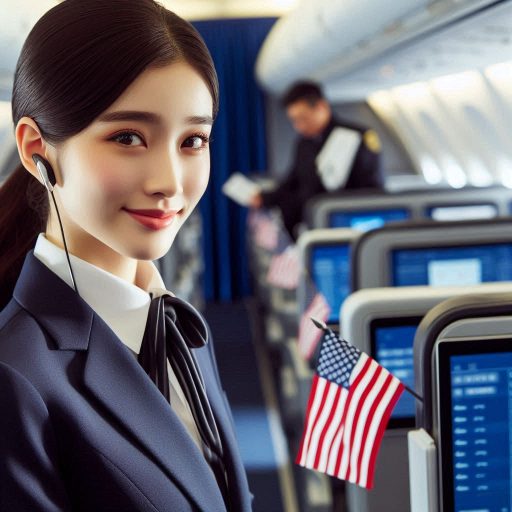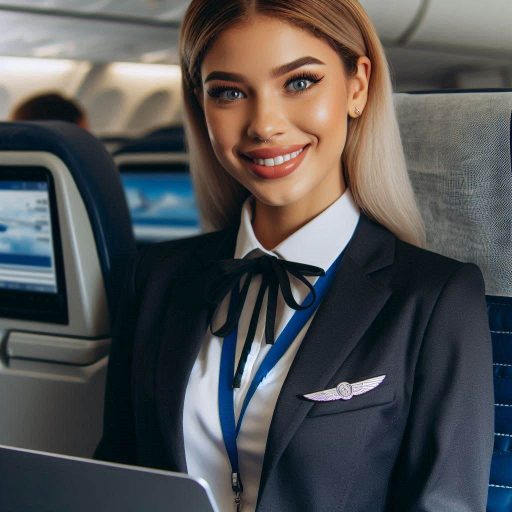Introduction
In the airline industry, customer service is critical to ensuring a positive and lasting impression.
Airlines are not just about transporting passengers; they are about providing a complete travel experience.
This experience hinges on the quality of customer service provided throughout the journey.
From the moment passengers check in until they reach their destination, every interaction matters.
Good customer service can build loyalty, retain customers, and strengthen the airline‘s reputation.
In such a competitive industry, airlines that prioritize service stand out and earn repeat business.
Exceptional customer service enhances the overall travel experience, making passengers feel valued and appreciated.
It’s not just about solving issues; it‘s about anticipating needs and exceeding expectations.
Flight attendants play a key role in delivering this high level of service.
They are the face of the airline during the flight and are often the first point of contact for passengers.
Their job goes beyond serving meals and beverages.
They ensure that passengers are comfortable, safe, and well-cared-for throughout the journey.
In-flight customer service directly affects how passengers perceive their entire travel experience.
Passengers often remember their interactions with flight attendants more than any other part of the trip.
A warm smile, friendly conversation, or quick solution to a problem can turn a stressful flight into a pleasant one.
Flight attendants must be skilled in communication, conflict resolution, and multitasking.
Every passenger has different needs, and flight attendants must adapt quickly to meet them.
They ensure that customers feel heard, respected, and safe while on board.
Effective communication helps defuse situations before they escalate, ensuring smooth and stress-free flights.
Beyond handling immediate requests, flight attendants are responsible for passenger safety.
They are trained to manage emergencies, medical issues, and any disturbances that may arise.
Their ability to stay calm and composed under pressure is vital to maintaining order in the cabin.
Maintaining a Positive Attitude
Maintaining a positive attitude is crucial for flight attendants as they interact with customers during flights.
Regardless of the challenges they may face, staying positive can make a significant difference in customer service experience.
Here are some tips on how flight attendants can maintain a positive attitude and approach customers with a smile:
Importance of staying positive regardless of challenging situations
Practice Gratitude
- Start your day with a gratitude journal or reflection to set a positive tone.
- Focus on the things you are grateful for, such as the opportunity to travel and meet new people.
Stay Grounded
- Take deep breaths and center yourself before interacting with customers.
- Remind yourself of the importance of your role in ensuring a smooth and pleasant flight experience for passengers.
Tips on how flight attendants can approach customers with a smile
Smile and Maintain Eye Contact
- A smile can go a long way in making customers feel welcome and comfortable.
- Make eye contact while speaking to customers to show attentiveness and engagement.
Practice Active Listening
- Give your full attention to customers when they are speaking.
- Repeat back important information to ensure accuracy and show that you are listening.
Handle Challenges Positively
- Approach challenges with a solution-oriented mindset rather than focusing on the problem.
- Stay calm and composed when addressing customer complaints or difficult situations.
Take Breaks and Practice Self-Care
- It’s essential to take short breaks during flights to recharge and avoid burnout.
- Practice self-care routines such as stretching or deep breathing exercises to maintain your well-being.
By following these tips, flight attendants can cultivate a positive attitude that will not only benefit their own well-being but also enhance the overall customer service experience for passengers.
Remember, a positive attitude is contagious and can create a ripple effect of positivity throughout the flight.
Read: How to Create a Pet-Friendly Grooming Environment
Effective Communication Skills
Significance of clear and concise communication with passengers
Clear and concise communication is crucial for flight attendants in ensuring a smooth and safe travel experience.
Passengers depend on flight attendants for vital information, whether related to safety, in-flight services, or general inquiries.
Miscommunication can cause confusion, frustration, and, in some cases, compromise passenger safety.
In high-stress environments, such as air travel, where quick decisions are often needed, clear instructions prevent panic and ensure passengers understand expectations.
In emergencies, precise communication can save lives.
Flight attendants need to give instructions swiftly, leaving no room for misinterpretation.
Passengers may be scared, confused, or distracted, so the ability to deliver simple, direct messages becomes essential.
Clarity in communication reassures passengers, builds trust, and promotes compliance with safety protocols.
A calm, clear voice helps prevent unnecessary chaos and keeps everyone focused on following instructions.
Strategies for flight attendants to communicate effectively in different situations, such as emergencies or during service
To communicate effectively, flight attendants must adapt their style based on the situation.
In routine service, a friendly yet professional tone works best.
When giving information, flight attendants should use simple language, avoiding jargon that might confuse passengers.
For example, instead of saying “Please stow your baggage in the overhead compartment,” they can simplify it to “Please put your bag in the storage bin above.”
During service, flight attendants should maintain eye contact and smile to create a positive atmosphere.
They should also listen carefully to passenger requests and repeat key points to confirm understanding.
For instance, if a passenger asks for a specific drink, confirming the order by repeating it back shows attentiveness and minimizes mistakes.
In emergency situations, communication becomes more urgent and direct.
Flight attendants should project confidence and authority when issuing safety instructions.
It’s helpful to break down instructions into clear, step-by-step commands.
For example, instead of saying, “In case of an emergency, put your oxygen mask on first before helping others,” flight attendants can say, “Place the mask over your nose and mouth.
Pull the straps to tighten. Help others after securing your mask.”
Non-verbal communication also plays a key role.
Flight attendants should use clear hand gestures to reinforce their words, especially during safety demonstrations or if verbal communication is limited.
Body language, such as standing tall and making purposeful movements, can convey confidence and control in tense situations.
Overall, effective communication is the cornerstone of excellent customer service for flight attendants.
By adjusting their communication approach based on the scenario, they can ensure a safe, pleasant, and well-managed flight for all passengers.
Read: Nail Technician Networking: Building Industry Connections
Empathy and Understanding
The Importance of Empathy in Dealing with Customers’ Needs and Concerns
Empathy is crucial for flight attendants when addressing passengers’ needs and concerns.
It builds trust and ensures passengers feel valued.
In the fast-paced environment of air travel, flight attendants must recognize passengers’ emotions and respond with understanding and care.
This proactive approach helps de-escalate tense situations and creates a positive experience for everyone on board.
Passengers often experience stress, anxiety, or discomfort during travel.
Empathy allows flight attendants to address not only the issue but also the emotional state of the passenger.
For example, if a passenger is upset about a delayed flight, the attendant can acknowledge their frustration.
Instead of giving a routine apology, saying, ‘I understand this delay is frustrating.
I would feel the same way,‘ helps diffuse tension and makes the passenger feel heard.
Empathy helps in fostering a calm and supportive environment, especially for passengers in distress.
Flight attendants who demonstrate care can transform stressful situations into manageable moments by acknowledging feelings and offering thoughtful responses.
Examples of How Flight Attendants Can Show Understanding and Compassion Towards Passengers
Flight attendants can show empathy in several ways, starting with nervous flyers.
Many passengers feel anxiety about flying, even on short flights.
A flight attendant who recognizes this fear can offer comforting words or small gestures to ease their concerns.
For instance, they might say, ‘Flying can be nerve-wracking, but you‘re in safe hands.
We‘re here for you.
‘ This reassurance helps passengers feel more supported and relaxed.
Another way flight attendants can show compassion is by helping passengers with special needs.
A passenger with a disability may require assistance boarding or storing carry-on luggage.
A flight attendant who offers help with patience and respect will ensure the passenger feels dignified and supported.
This approach shows passengers that their needs are a priority and that they are in a safe, accommodating environment.
Cultural differences and language barriers also provide opportunities to demonstrate empathy.
For instance, when a passenger struggles with language, the flight attendant can speak slowly, use simple words, or offer written instructions.
A warm smile or helpful gesture can bridge communication gaps and make the passenger feel understood and welcome.
Non-verbal communication is another powerful way to express empathy.
A warm smile, eye contact, and attentive listening show genuine care.
Simple acts like offering extra assistance or checking in on passengers regularly also demonstrate compassion, enhancing the overall travel experience.
Empathy and understanding are essential for flight attendants, as they help create a welcoming, respectful, and comfortable environment for all passengers.
Read: The Role of Technology in Modern Pet Grooming
Professionalism and Etiquette
Importance of Professionalism in All Interactions with Customers
Professionalism is crucial for delivering exceptional customer service as a flight attendant.
It sets the foundation for every interaction and directly impacts how passengers perceive the airline.
Displaying professionalism ensures that passengers feel valued, respected, and safe throughout their journey.
Maintaining a calm demeanor is essential, especially in challenging situations.
Whether dealing with an irate passenger or a stressful in-flight issue, staying composed reassures customers and prevents escalation.
A calm and confident approach shows passengers that flight attendants are in control, no matter the circumstances.
Clear, respectful communication is another critical aspect of professionalism.
Flight attendants must ensure their tone is polite, regardless of the situation.
Whether delivering important safety information or answering a customer‘s query, communicating with courtesy and precision is key.
Simple gestures like smiling, making eye contact, and addressing passengers respectfully can make a huge difference.
Every passenger interaction is a reflection of the airline‘s values, and professionalism enhances trust in the airline.
By consistently demonstrating professional behavior, flight attendants create a positive atmosphere that promotes comfort and security for all passengers.
Tips on Maintaining Proper Etiquette and Decorum While Delivering Customer Service
Proper etiquette plays a central role in delivering high-quality customer service.
As a flight attendant, maintaining decorum is essential to fostering a welcoming environment.
Here are key tips for upholding proper etiquette in all customer interactions.
First, use respectful language at all times.
Avoid slang or overly casual expressions when speaking with passengers.
Instead, opt for polite, professional language that shows respect and attentiveness.
Simple phrases like ‘please,‘ ‘thank you,‘ and ‘excuse me‘ go a long way in creating a pleasant experience for customers.
Next, pay close attention to body language.
Non-verbal communication is just as important as spoken words.
Standing tall, maintaining an open posture, and offering a genuine smile can make passengers feel more at ease.
Avoid crossing arms or displaying frustration, as this can make customers feel unwelcome.
Flight attendants should also ensure they meet grooming and uniform standards.
A clean, well-maintained appearance reflects the airline‘s commitment to excellence.
Additionally, good personal hygiene is crucial for maintaining a professional image.
When dealing with difficult passengers, patience is key.
It‘s important to avoid responding emotionally and instead remain calm and respectful.
Listening actively to passengers‘ concerns and addressing them politely, even when they are upset, helps de-escalate tense situations.
By following these etiquette tips, flight attendants can deliver service with decorum while ensuring passengers feel valued and respected.
Read: Customer Service Tips for Pet Grooming Professionals

Adaptability and Problem-Solving
The Need for Flight Attendants to Be Adaptable and Quick Problem Solvers
Flight attendants must be adaptable and quick problem solvers to ensure smooth, enjoyable flights.
Air travel can be unpredictable, with sudden changes requiring immediate action.
Whether dealing with flight delays, passenger concerns, or unforeseen challenges, flight attendants must adjust their approach quickly.
Their ability to think on their feet and offer practical solutions ensures passengers feel secure and well-cared-for.
In this fast-paced environment, passengers appreciate swift responses to their needs, making adaptability crucial to providing excellent service.
Being adaptable allows flight attendants to manage diverse situations calmly and confidently.
Some passengers may be anxious, while others might need special assistance or face language barriers.
By adapting to each passenger‘s unique needs, flight attendants can provide personalized care.
This attentiveness helps build trust and confidence, contributing to a positive overall experience.
Examples of How Flight Attendants Can Handle Unexpected Situations and Ensure Customer Satisfaction
Flight delays are a common issue that tests flight attendants‘ adaptability.
Passengers often become frustrated during delays.
To handle this, flight attendants should keep passengers informed with regular updates.
Clear communication helps ease anxiety and reassures passengers that the situation is under control.
Offering refreshments, providing extra entertainment options, or simply offering a listening ear can improve the passenger experience and reduce frustration during these moments.
Another common situation is dealing with seat assignment issues, such as overbooked flights or requests to change seats.
For instance, a family may wish to sit together or a passenger may need an aisle seat for medical reasons.
Flight attendants must quickly assess the situation and find a solution, whether that means politely asking other passengers to switch seats or coordinating with gate agents to find an alternative.
By resolving seating issues with tact and flexibility, they ensure customers feel respected and valued.
Medical emergencies can also arise unexpectedly.
In such cases, flight attendants must act quickly to assess the situation and provide assistance.
For example, if a passenger becomes unwell, they might administer first aid, call for a medical professional on board, or communicate with the cockpit to arrange for an emergency landing if necessary.
These quick, decisive actions demonstrate strong problem-solving skills and show passengers that their safety is a priority.
In summary, adaptability and problem-solving are essential skills for flight attendants.
By remaining flexible and providing timely solutions, they ensure passenger satisfaction, even when unexpected situations occur.
Attention to Detail
The significance of paying attention to small details to enhance the customer experience
Attention to detail is crucial for flight attendants, as it can significantly enhance the customer experience.
When passengers feel that their needs are noticed and catered to, it creates a positive and lasting impression.
The smallest actions can contribute to a smoother, more enjoyable journey.
These details, often overlooked, play a big role in shaping a passenger‘s perception of the airline.
Attending to them consistently shows professionalism, care, and a commitment to customer satisfaction.
For instance, noticing that a passenger prefers a particular beverage or meal type can make a big difference.
By remembering and acting on these preferences, flight attendants demonstrate that they are attentive and thoughtful.
These seemingly minor touches can turn an ordinary flight into a memorable one, which builds passenger loyalty.
Suggestions on how flight attendants can demonstrate attention to detail, such as remembering personal preferences or anticipating needs
Flight attendants can show attention to detail in various ways.
One effective approach is to actively listen during passenger interactions.
When a passenger mentions a preference or need, take note of it and act on it promptly.
For example, if a passenger prefers a specific type of drink, serve it to them without needing to ask again.
This not only saves time but shows that you genuinely care about their experience.
Another way to demonstrate attention to detail is by anticipating needs before they are expressed.
For instance, offer extra pillows or blankets if you notice passengers trying to get comfortable.
If someone seems tired, offer a glass of water or tea to help them relax.
Observing passengers’ body language can often reveal what they need without them having to ask.
In addition, making small adjustments based on passenger feedback, like offering more legroom space when possible, can enhance comfort.
Flight attendants should also pay attention to the cleanliness of the cabin and seat areas.
Keeping the environment neat and orderly reflects an attentive and well-organized crew.
Remembering names, where possible, adds a personal touch.
Passengers appreciate being treated as individuals, and acknowledging them by name creates a more personable experience.
Finally, being proactive by checking in on passengers throughout the flight‘rather than waiting for a call button‘demonstrates attentiveness and readiness to assist.
By mastering attention to detail, flight attendants can significantly elevate the quality of service they provide.
It‘s these small actions that make passengers feel special and ensure a pleasant and memorable flight.
Teamwork and Collaboration
Effective teamwork among flight attendants is crucial for delivering exceptional customer service.
Collaboration ensures a seamless experience for passengers and a positive work environment for the crew.
Transform Your Career Today
Unlock a personalized career strategy that drives real results. Get tailored advice and a roadmap designed just for you.
Start NowImportance of Teamwork
- Support System: Flight attendants rely on each other for assistance during challenging situations.
- Division of Tasks: Working together allows tasks to be divided based on strengths and skills.
- Efficiency: Teamwork leads to quicker problem-solving and response times, enhancing the overall customer experience.
- Unity: A unified team fosters a sense of camaraderie and support, creating a positive work environment.
Strategies for Effective Collaboration
- Clear Communication: Establish open and clear lines of communication among the crew.
- Role Assignment: Clearly define roles and responsibilities to avoid confusion and ensure efficiency.
- Mutual Respect: Treat each team member with respect and value their contributions to the team.
- Debriefing Sessions: Conduct debriefing sessions to discuss challenges and successes, promoting continuous improvement.
- Training and Development: Invest in ongoing training to improve skills and enhance teamwork within the crew.
- Cross-Training: Encourage cross-training to expand knowledge and skills, promoting a versatile team.
- Conflict Resolution: Address conflicts promptly and professionally to maintain a harmonious work environment.
Communication Tips for Flight Crew
- Use Clear Language: Avoid jargon or technical terms that passengers may not understand.
- Be Approachable: Maintain a friendly and welcoming demeanor to encourage open communication.
- Listen Actively: Pay attention to passengers’ needs and feedback to provide personalized service.
- Provide Updates: Keep passengers informed about flight status, delays, and any changes to ensure transparency.
- Team Briefings: Conduct pre-flight briefings to ensure everyone is informed and on the same page.
- Emergency Procedures: Review emergency protocols regularly to ensure swift and coordinated responses in case of emergencies.
By prioritizing teamwork and effective collaboration, flight attendants can deliver exceptional customer service that exceeds passengers’ expectations and creates a memorable flying experience.
Handling Difficult Customers
Flight attendants often face challenging interactions with passengers.
Handling these moments calmly and professionally is key to maintaining a positive environment onboard.
Techniques for Handling Difficult or Irate Customers Calmly and Professionally
Stay Calm and Composed
The first step to managing difficult customers is maintaining your calm.
When passengers become irate, keep your voice steady and avoid showing frustration.
By staying composed, you help prevent further escalation and set a positive example.
Listen Actively
When a passenger is upset, allow them to express their concerns without interruption. Active listening is critical in these moments.
Nod, maintain eye contact, and repeat key points back to them to show you are paying attention.
This approach helps the passenger feel heard and understood, which can diffuse their anger.
Acknowledge Their Feelings
Acknowledge the customer’s emotions, even if you cannot solve the issue immediately.
Phrases like, “I understand this must be frustrating,” or “I see where you’re coming from,” can help.
Recognizing their feelings lets them know their concerns are taken seriously, which often reduces tension.
Apologize Sincerely
Even if the problem is beyond your control, offering a genuine apology is a great way to calm someone down.
A simple “I‘m sorry for the inconvenience” shows empathy and demonstrates that you care about resolving their issue.
Tips on De-escalating Conflicts and Finding Effective Solutions to Resolve Customer Complaints
Offer Solutions, Not Excuses
Instead of explaining why something went wrong, shift your focus to finding solutions.
Offer clear, actionable steps to resolve the issue or show them how you can assist.
For example, if a meal preference isn‘t available, offer alternatives or let them know when the next service will be.
Stay Positive
A positive attitude goes a long way in customer service. Use positive language when suggesting alternatives or solutions.
Avoid saying, “I can’t do that,” and instead offer what you can do: “Let me see how I can help.” This keeps the interaction productive.
Know When to Involve a Supervisor
If a situation escalates beyond your control, don‘t hesitate to call for a supervisor or purser.
Involving a senior crew member shows the passenger that their concern is being taken seriously, while also giving you support in managing the conflict.
Follow Up
After resolving a customer complaint, follow up to ensure they are satisfied.
A quick, “Is there anything else I can help with?” shows continued care and commitment to their experience.
This final touch can turn a negative situation into a positive one.
By using these strategies, flight attendants can handle difficult customers calmly, resolve conflicts effectively, and maintain a safe, pleasant flight environment.
Discover More: Essential Qualities of a Trustworthy Locksmith
Conclusion
After discussing various customer service tips for flight attendants, it is crucial to recap the key points.
Flight attendants should always maintain a positive and professional attitude, anticipate passenger needs, and communicate effectively.
It is essential to prioritize passenger safety, maintain a clean and organized cabin, and handle difficult situations calmly.
Excellent customer service is vital in the airline industry, as it directly impacts the passenger experience and overall satisfaction.
Flight attendants play a critical role in ensuring a positive experience for passengers by providing top-notch service and support.
By following these customer service tips, flight attendants can create a welcoming and comfortable environment for travelers, fostering loyalty and satisfaction.
Ultimately, exceptional customer service from flight attendants can make a significant difference in passengers’ overall flying experience.
[E-Books for Sale]
The Big Book of 500 High-Paying Jobs in America: Unlock Your Earning Potential
$19.99 • 500 High-Paying Jobs • 330 pages
Explore 500 high-paying jobs in America and learn how to boost your career, earn more, and achieve success!
See All 500 High-Paying Jobs of this E-Book
1001 Professions Without a Degree: High-Paying American Jobs You Can Start Now
$19.99 • 1001 Professions Without a Degree • 174 pages
Discover 1001 high-paying jobs without a degree! Unlock career tips, skills, and success strategies for just $19.99!




